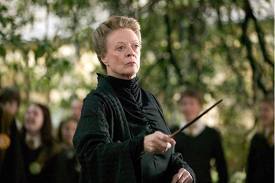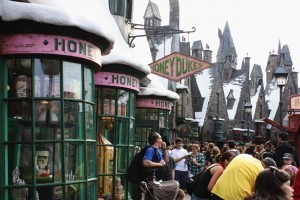What Rowling Got Right: Worldbuilding as Plot
 I got to see the last Harry Potter film last weekend and loved it to bits – it reminded me why I liked the books so much originally, and even redeemed some of the bits I didn't like about the final book. They conveyed far more sweetness & believability to the Remus/Tonks relationship by cutting out most of what was in the book & sticking with a couple of symbolic shots, and the epilogue actually worked as a visual scene far better than in prose.
I got to see the last Harry Potter film last weekend and loved it to bits – it reminded me why I liked the books so much originally, and even redeemed some of the bits I didn't like about the final book. They conveyed far more sweetness & believability to the Remus/Tonks relationship by cutting out most of what was in the book & sticking with a couple of symbolic shots, and the epilogue actually worked as a visual scene far better than in prose.
But really I did that thing I always do when I go to the cinema – I sat there, let the images wash over me, and thought about writing. The big screen always does that to me – we spend a fortune on tickets and then I spend half the time plotting & replotting my own stories. My brain is particularly directed towards technique at the moment because of the stage I'm at drafting Fury, and HP7.2 really helped me by reminding me of the one writing technique that Rowling does better than almost any other writer: worldbuilding as plot.
People talk a lot about how crap the HP books are, as if it's a given that they're badly written. I'm as guilty of this as everyone else – I get cranky at the occasional rough seam, poking and prodding at it, instead of appreciating how good the overall pattern is. So here's a positive post about JK's writing skills!
Harry Potter and the Deathly Hallows – and I'm thinking especially of the book here rather than the films, though a lot of this applies to both) – is packed with magical items, people and settings. It's a chaotic mass. But there's very little in it that wasn't seeded one way or another in previous books. The cleverness of the Harry Potter books is how the worldbuilding is added, one brick at a time, usually wrapped around a piece of plot to keep it in place. So it's there when, much later, it's needed again.
 It helps of course that a major plot strand of each book is 'Harry learns magic' and that the whole thing revolves around a magical school. It helps a lot. It also helps that Harry is an outsider who learns about the magical world in tiny, bite-sized pieces. But neither of these things are accidents. These are both traditional methods for expressing a fantasy world.
It helps of course that a major plot strand of each book is 'Harry learns magic' and that the whole thing revolves around a magical school. It helps a lot. It also helps that Harry is an outsider who learns about the magical world in tiny, bite-sized pieces. But neither of these things are accidents. These are both traditional methods for expressing a fantasy world.
The genius of Rowling is in the telling detail. The Snitch Harry catches in his mouth (to show how jammy his luck is, and make us not hate him for being too effortless in how he has picked up Quidditch), the invisible cloak that enables him to get into his various scrapes with his friends over the years, Polyjuice, the unreliability of prophecy, the Pensieve, the Patronus, the ghosts of each House, the goblins and the bank vaults, the rules of duelling … all of these things, which are vital to the final part of the story, were tethered to the world of Harry Potter through their own plot strands, many books ago.

Worldbuilding should never be a shopping list of pretty props, particularly when we're talking about magic systems. They should also never be revealed to the reader or any character in the book through a lecture – or at least, not only through a theory lesson. If you put a gun on the side table, you have to use it, right? So the best way to explain the magic system or any other important worldbuilding details of your world is to intricately weave them into the plot.
It's all about me, of course, and Nancy Napoleon. I'm over 50,000 words into a manuscript and I don't yet have the magic system nailed down. It's a problem, because this is something I not only need to establish back in the first few chapters, but I need to put it in there as if it could never have been anywhere else. I need to make magic matter that early, even though she's busy with her drama and grief and guilt and job and all that other stuff. I need to figure it out, damn it. Because apparently I managed to skate over all the details in Siren Beat. I know there are curses, but I can't have just curses, because Holly Black already did that. I am feeling my way through a sympathetic magic system, using words and objects, but it's not there yet. I can see places in my story where explaining and displaying how magic works will be perfect, but I don't yet know what that magic is!
My magical creatures and my romanceish and my backstory and my teenage helper characters and my smutty bits are all tied into the plot and theme of the novel. How did I forget the magic?
Obviously I need to ask 'what would Rowling do' a bit more often in my writing process. As long as I'm not writing sex scenes at the time…




